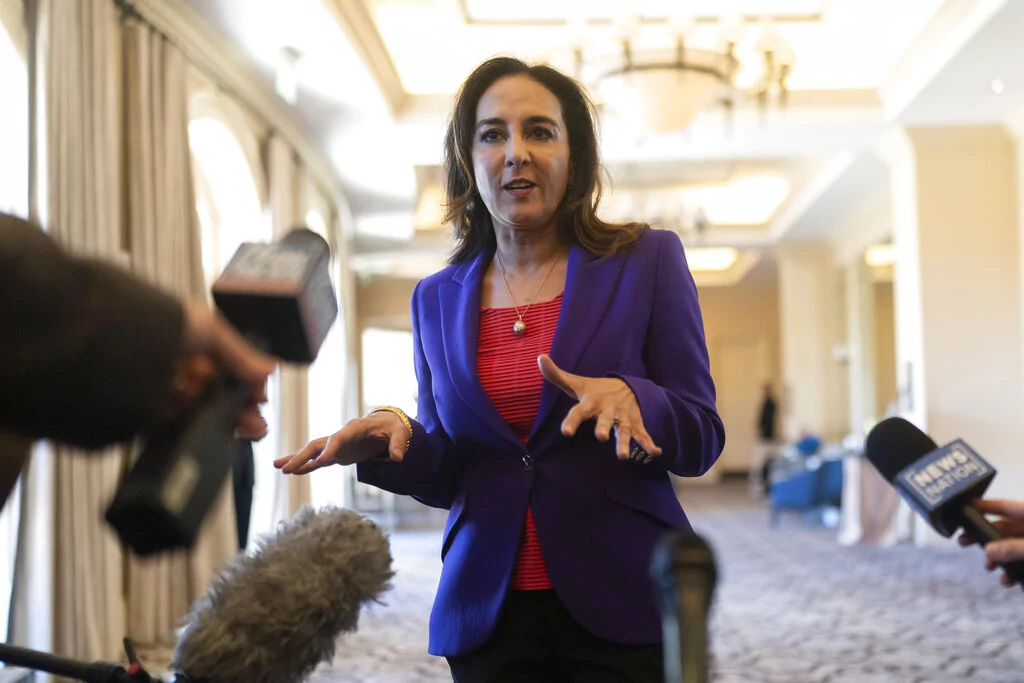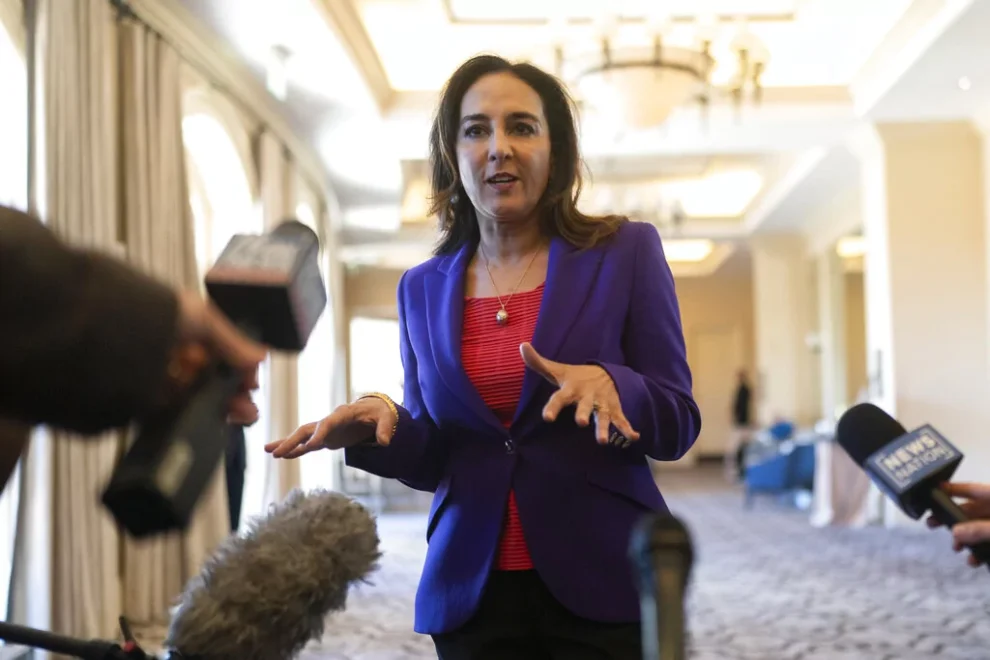A Department of Justice division tasked with protecting basic individual rights is expected to shift its position on key social issues under President-elect Donald Trump and, if confirmed, conservative lawyer Harmeet Dhillon.
The DOJ Civil Rights Division is likely to change its approach to diversity, voting, abortion, and transgender topics under Dhillon, who has a dense track record of pushing Republican causes in these areas.
The division is poised to make one of its top priorities rooting out race-conscious policies across industries. Trump hinted as much when he announced Dhillon’s nomination, praising her for “suing corporations who use woke policies to discriminate against their workers.”
Dhillon recently signaled she was on board by sharing an op-ed by her law firm partner that denounced diversity, equity, and inclusion as “divisive” and dead on arrival in the Trump administration.
DEI is a framework used by companies and in academia to elevate minorities. Proponents say it helps vulnerable populations achieve equal status in society, while opponents say it has unforgivable adverse effects, such as discounting a person’s merit and discriminating against majority demographics.
‘Colorblind Constitution’
The Civil Rights Division, established in 1957 to combat discrimination, is set to enforce Trump and Dhillon’s stance on DEI across the country by arguing wherever possible that the policies are discriminatory. The division may, however, encounter initial obstacles from the Equal Employment Opportunity Commission, a five-member panel that has a Democratic majority for the next year and jurisdiction over federal employment laws.
Roger Severino, a Heritage Foundation vice president who worked as an attorney in the Civil Rights Division during most of the Obama administration, criticized the current division for flouting the Supreme Court by supporting racial preferences, particularly in higher education.
The division has been “resisting the notion of a colorblind Constitution that has been repeatedly affirmed by the Supreme Court,” Severino told the Washington Examiner.
When the Supreme Court ruled that Harvard University’s practice of affirmative action — that is, favoring certain racial minorities in its admissions process — was unconstitutional, the Civil Rights Division, led by current Assistant Attorney General Kristen Clarke, published a document about ways to circumvent the ruling and to continue to factor race into admissions.
“They’ve been pushing a woke agenda of racial preferences, which we would expect that to change under Trump and Harmeet Dhillon,” Severino said.
He called Dhillon the “perfect person to restore integrity to the storied Civil Rights Division,” adding that it “has to go back to its roots of the vision of Dr. Martin Luther King of a colorblind society.”
Who is Harmeet Dhillon?
Dhillon, a San Francisco-based lawyer, is the founder of Dhillon Law Group and the nonprofit Center for American Liberty. She has had a hand in a host of headline-grabbing conservative lawsuits, waging legal fights for Trump, activists such as David Daleiden and Andy Ngo, and conservative companies such as the Daily Wire.
Dhillon went on a high-profile legal spree in 2020 and 2021 in which she targeted COVID-19 restrictions. She later said the lawsuits, while mostly unsuccessful in court, pressured government officials to tame their overreach. She described her efforts at the time as an “extended triage” to address a “civil rights crisis.”
Dhillon’s right-wing bona fides also include running to replace Ronna McDaniel as Republican National Committee chairwoman in 2022. She lost on a secret ballot, gaining about half the votes of McDaniel.

Wally Zimolong, a Pennsylvania-based lawyer who has worked on cases with Dhillon, told the Washington Examiner that Dhillon was a “brilliant lawyer, fierce advocate for the United States Constitution, and stalwart defender of President Trump’s America First agenda.”
He praised her for taking difficult cases that “most lawyers were too afraid” to touch.
“For example, when petty tyrant governors, like Gavin Newsom, engaged in rampant unconstitutional behavior during the state-created COVID lockdowns, Harmeet was one of the first attorneys in the country to bring suit,” Zimolong said.
Election fraud fights
Under Clarke, the DOJ zeroed in on voter suppression. It brought controversial lawsuits in Virginia and Alabama in 2024 alleging the states had flawed processes for removing noncitizens from voter rolls that resulted in deactivating eligible voters.
Dhillon, who has pushed to tighten election laws, is unlikely to bring cases of that nature. Dhillon joined in on legal fights that stemmed from states relaxing their voting laws in 2020 in the name of COVID-19.
She was part of a team, along with Zimolong, that sued to stop Pennsylvania’s no-excuse mail-in voting, but the state’s Supreme Court eventually deemed it constitutional.
Dhillon’s firm successfully represented Trump in his fight against Colorado after the state’s highest court kicked him off the primary ballot, ruling he engaged in an insurrection and was therefore ineligible to serve as president. The U.S. Supreme Court reversed the decision, forcing the state to keep Trump on the ballot.
Democracy Docket, run by Democrat-aligned powerhouse Marc Elias, criticized Dhillon in a press release, calling her an “anti-voting” lawyer who has “spread right-wing conspiracy theories including unsubstantiated claims about election fraud.”
‘Transgender ideology’
The Civil Rights Division under Clarke has prioritized hate crimes against people based on their gender identity. But the division has drawn criticism from conservatives for overstepping by forcing viewpoints on them that they perceive as science-defying. The division has, for example, issued a broad threat to employers who decline to use a person’s preferred pronouns or decline to allow a person in a bathroom that does not correspond to their sex. It has also lumped gay and transgender topics together at times, including by operating an “LGBTQI+” working group.
“You’ve seen them try to redefine sex to include gender identity in every single statute they come across, and pushing for biological boys in girls’ sports,” Severino said. “That’s being very aggressive, injecting liberal politics into the law.”
Dhillon, if confirmed, would likely move to curtail any of the DOJ’s legal activity that prioritizes a person’s gender identity over their sex, especially with regard to minors.
She has blasted “transgender ideology being pushed in schools” and described one of her transgender cases, representing plaintiff Chloe Cole, as “perhaps the most important human rights case” she has handled in her life. Cole, a woman who identified as a boy during her teenage years, sued her medical providers, alleging they caused her irreversible harm by recklessly giving her puberty blockers and performing a mastectomy on her when she was a minor.
FACE Act
The DOJ Civil Rights Division, under the Biden administration, has enforced the Freedom of Access to Clinic Entrances Act more than any other administration.
The FACE Act was established in 1994 to preserve access to abortion clinics and anti-abortion pregnancy counseling centers, including faith-based facilities and churches. However, despite a spike in violent and destructive attacks on both types of buildings, the Biden administration’s prosecutions against anti-abortion activists have far outnumbered the prosecutions against the other side.
CLICK HERE TO READ MORE FROM THE WASHINGTON EXAMINER
Under Biden and Clarke, the DOJ has brought charges against dozens of mostly anti-abortion defendants and has been criticized for being overzealous in certain cases, such as those involving elderly women or in the case of Catholic father Mark Houck, whose controversial charges were unanimously rejected by a jury.
The first Trump administration’s DOJ brought five single-defendant criminal cases under the FACE Act, according to federal data. The new Trump administration is likely to revert to this limited use of it.
























